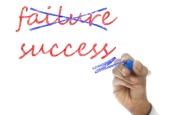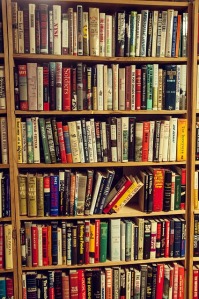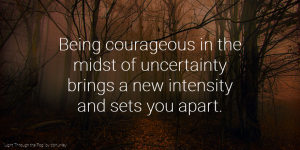Writers, are you having trouble getting published? I sympathize. Yet, be ready! In a month, week, or day or a few hours, or minutes, you may come in contact with that one editor, one agent you must have confidence exists here, there, somewhere, who will discover you, recognizing your potential, your craft, your genius the way young Faber & Faber editor Charles Monteith recognized novelist William Golding’s immense promise when no one else in the world did.
William Golding
Monteith was charming, witty, and sophisticated, qualities Golding did not possess. Golding’s novel Lord of the Flies was Monteith’s first editorial project; his first taste of an editor’s role. Some editors–very capable in other areas–are surprisingly poor at judging the work of beginning writers, but that was not the case with Monteith.
 The manuscript Golding submitted was worn, torn, and stained when Monteith first saw it. It had obviously been rejected by other publishers. Even Monteith agreed that this work of a public school teacher was over-written, disorganized, repetitive–a mess–and seemed never to get started. After many rejections Golding was losing hope of having the book published, of ever being published.
The manuscript Golding submitted was worn, torn, and stained when Monteith first saw it. It had obviously been rejected by other publishers. Even Monteith agreed that this work of a public school teacher was over-written, disorganized, repetitive–a mess–and seemed never to get started. After many rejections Golding was losing hope of having the book published, of ever being published.
But Monteith saw “something” in the book, and in Golding –the work of a unique talent–and fought for it at editorial conferences, almost coming to blows with a senior editor who was known to have impeccable taste in picking properties that would succeed. Monteith prevailed, staking his young reputation on the book. Lord of the Flies was published, caught on, and was published in many languages. Many Golding/Monteith novels followed. Monteith and Golding were editor and author friends the rest of their lives. William Golding was awarded the Nobel Prize in literature in 1983.
What might have happened had Golding’s beaten-up manuscript not caught the eye of the best possible editor for him? One day you may be fortunate: a Monteith may be excited by your work and discover you.
The Need to Be Discovered
The logical conclusion of the process of serious writing is to see the work published. Before writers get published they have to be discovered, to  be recognized as a person with a talent that can generate revenue. When a writer is discovered by an agent or publisher, their life changes for the better. This post is about writers who were discovered, then published, and found success–perhaps more success than they expected. There are so many writers with all the talent in the world who are trying very hard to be discovered by an agent or publisher who is trying as hard to discover them. There is a good chance that many writers we read would never have been published had they not been discovered by the right agent and a right publisher.
be recognized as a person with a talent that can generate revenue. When a writer is discovered by an agent or publisher, their life changes for the better. This post is about writers who were discovered, then published, and found success–perhaps more success than they expected. There are so many writers with all the talent in the world who are trying very hard to be discovered by an agent or publisher who is trying as hard to discover them. There is a good chance that many writers we read would never have been published had they not been discovered by the right agent and a right publisher.
Harold Kushner
A friend of mine was the late Rabbi Harold Kushner. He too was discovered by an editor with insight and moxie. Harold personally hand-carried his manuscript to publisher after publisher in New York and Boston. Every publisher rejected When Bad Things Happen to Good People. Editors said the book couldn’t possibly succeed. For one thing it was “too Jewish.”
 Finally a small publisher picked it up. However, this editor who discovered the book, was different. He was enthusiastic and said to Harold, “Your book is going to be a best seller.” Finally what Harold had been hoping for: someone had faith in the book and its spiritual message. It became a phenomenal best -seller, the most popular book in the world, selling twenty -five million copies.
Finally a small publisher picked it up. However, this editor who discovered the book, was different. He was enthusiastic and said to Harold, “Your book is going to be a best seller.” Finally what Harold had been hoping for: someone had faith in the book and its spiritual message. It became a phenomenal best -seller, the most popular book in the world, selling twenty -five million copies.
Thomas Wolfe
Scribner’s editor Maxwell Perkins discovered biographical novelist Thomas Wolfe. Wolfe was the most talented writer of his generation. His monumental goal was to convey in his writing every experience he had ever had. His vocabulary and expressiveness with language was so stunningly extraordinary that it didn’t take a genius to recognize that Wolfe was one. Wolfe wasted ten years trying to be a playwright until his married lover, patron, and muse Aline Bernstein told him, “You were not meant to be a dramatist. You should be writing novels.” The popularity of his first novel Look Homeward Angel marked him as a major talent, so much so that when fellow American Sinclair Lewis was awarded the Nobel Prize in Literature in November, 1930 Lewis praised Wolfe as the writer to be reckoned with in the future.
 Maxwell Perkins was the greatest American editor. Editor of giants Wolfe, F. Scott Fitzgerald, and Ernest Hemingway at the same time, he tutored and guided Wolfe who never had a concept of “a publishable book.” Thousands of hand-written words poured out of high-energy Wolfe in a frenzy all night long. In the morning a woman picked the pages off the floor of his New York apartment, where Wolfe had thrown them, and typed them up. Perkins taught and tutored Wolfe literally daily. Each man considered their meeting and their relationship the most important event in their lives. Perkins gave Wolfe assignments such as “You have to cut this episode by six thousand words,” and “Cut the book by 200, 000 words. I’ll help you.”
Maxwell Perkins was the greatest American editor. Editor of giants Wolfe, F. Scott Fitzgerald, and Ernest Hemingway at the same time, he tutored and guided Wolfe who never had a concept of “a publishable book.” Thousands of hand-written words poured out of high-energy Wolfe in a frenzy all night long. In the morning a woman picked the pages off the floor of his New York apartment, where Wolfe had thrown them, and typed them up. Perkins taught and tutored Wolfe literally daily. Each man considered their meeting and their relationship the most important event in their lives. Perkins gave Wolfe assignments such as “You have to cut this episode by six thousand words,” and “Cut the book by 200, 000 words. I’ll help you.”
Jack London
 Persistent and confident in spite of failures, Jack London submitted his manuscripts hundreds of times to publishers that rejected the work before an editor discovered him. But after that, within a single year London, a self-educated writer, took the literary world by storm and was the most popular, most critically and financially successful novelist/short story writer in the world.
Persistent and confident in spite of failures, Jack London submitted his manuscripts hundreds of times to publishers that rejected the work before an editor discovered him. But after that, within a single year London, a self-educated writer, took the literary world by storm and was the most popular, most critically and financially successful novelist/short story writer in the world.
Talented People Looking For a Break
I traveled extensively in North America and Europe during my career as author/public speaker and often after a work day and dinner would have a drink in the hotel lounge and enjoy the entertainment.  Invariably I would think, “All these incredibly talented performers I see–artists who are looking for a big break and are dying to be discovered.” Much like them, so many writers with so much talent also are trying very hard to be discovered. Without the people who discovered William Golding, Thomas Wolfe, Harold Kushner, or Jack London, would we have ever heard of those famous authors?
Invariably I would think, “All these incredibly talented performers I see–artists who are looking for a big break and are dying to be discovered.” Much like them, so many writers with so much talent also are trying very hard to be discovered. Without the people who discovered William Golding, Thomas Wolfe, Harold Kushner, or Jack London, would we have ever heard of those famous authors?
© 2023 David J. Rogers
For my interview from the international teleconference with Ben Dean about Fighting to Win, click the following link:
Order Fighting to Win: Samurai Techniques for Your Work and Life eBook by David J. Rogers
or
Order Waging Business Warfare: Lessons From the Military Masters in Achieving Competitive Superiority
or


 Writers and artists throughout history have feared and hated rejections of their work.
Writers and artists throughout history have feared and hated rejections of their work. Each rejection compounds the effects of the previous rejections and can lead writers and artists from heights of blissful optimism to the total disappearance of confidence. Yet without
Each rejection compounds the effects of the previous rejections and can lead writers and artists from heights of blissful optimism to the total disappearance of confidence. Yet without  respond when editors reject their work, and there it was, the questions “What is winning? Is winning the only thing that matters? Is getting published the only thing that matters? Is that the only credential that makes you a significant literary person?”
respond when editors reject their work, and there it was, the questions “What is winning? Is winning the only thing that matters? Is getting published the only thing that matters? Is that the only credential that makes you a significant literary person?” I remember once learning that a publishing house I was interested in submitting to typically received 5,000 unsolicited manuscripts a year. Less than seventy would be published. What about those thousands of disappointed writers? I’m sure they had worked very hard and had high hopes. But their hopes would be shattered. Are they to conceive of themselves as failures? Are they supposed to give up hope of ever being successful?
I remember once learning that a publishing house I was interested in submitting to typically received 5,000 unsolicited manuscripts a year. Less than seventy would be published. What about those thousands of disappointed writers? I’m sure they had worked very hard and had high hopes. But their hopes would be shattered. Are they to conceive of themselves as failures? Are they supposed to give up hope of ever being successful? You are winning and not failing when you are persistent in spite of setbacks, are able to recover quickly, and are resilient.
You are winning and not failing when you are persistent in spite of setbacks, are able to recover quickly, and are resilient. You are winning and not failing when you are
You are winning and not failing when you are  Those are the ways you are really winning even during those times when it feels like you are not.
Those are the ways you are really winning even during those times when it feels like you are not. had, but doesn’t. It is a highly-regarded journal and would enhance any serious writer’s reputation to appear in it. That journal had published other pieces of Kathy’s in the past during her particularly prolific period when work poured out of her and was in demand by editors and readers. Some of her books were being published at the time, and many of her articles appearing in magazines were achieving record readership scores.
had, but doesn’t. It is a highly-regarded journal and would enhance any serious writer’s reputation to appear in it. That journal had published other pieces of Kathy’s in the past during her particularly prolific period when work poured out of her and was in demand by editors and readers. Some of her books were being published at the time, and many of her articles appearing in magazines were achieving record readership scores. I am talking about the difference between writers whose overriding goal is to see their work in print–a Publication Focus–contrasted with writers whose overriding goal stops short of publication in which they are not interested. They are concerned solely with generating what is in their judgment the highest possible quality text–a Production Focus. The latter are more than contented to produce works they are proud of without seeing them published.
I am talking about the difference between writers whose overriding goal is to see their work in print–a Publication Focus–contrasted with writers whose overriding goal stops short of publication in which they are not interested. They are concerned solely with generating what is in their judgment the highest possible quality text–a Production Focus. The latter are more than contented to produce works they are proud of without seeing them published. matters to them is that the works they produce be the best they have the skills to produce. They believe that because they are not interested in publishing but in producing the highest quality work they can, they are more creative and do better work than they would were they competing with others to see their work in print, and there are grounds for that belief.
matters to them is that the works they produce be the best they have the skills to produce. They believe that because they are not interested in publishing but in producing the highest quality work they can, they are more creative and do better work than they would were they competing with others to see their work in print, and there are grounds for that belief. produced was then graded by professionals–seasoned painters grading the paintings, experienced writers the writing, etc. The results were significant in that no matter what the reward was or when it was given, if the subjects thought they were working for external rewards, even a little trinket, and not for fun and pleasure, they became less creative. But when they were light-hearted and fooling around and no external reward was involved, they were more creative and their work was better.
produced was then graded by professionals–seasoned painters grading the paintings, experienced writers the writing, etc. The results were significant in that no matter what the reward was or when it was given, if the subjects thought they were working for external rewards, even a little trinket, and not for fun and pleasure, they became less creative. But when they were light-hearted and fooling around and no external reward was involved, they were more creative and their work was better. a clear, informative, and entertaining way concepts that were unfamiliar to western thinking. It was a challenge because the concept of the book was totally new and original. Every day’s work of many hours was fulfilling, I didn’t spend a second thinking about how my book would do in the stores, only about the book’s clarity and how useful I could make it and how inviting it would be for readers. It was a highly successful and profitable book and my ambitions for the next book I began were high. But I found my thoughts losing focus. They often wandered away from the book’s content and style and how to satisfy the reader to where I would build the new house the new book’s royalties would bring me and the kind of cars I would buy. Both books received many accolades and made best seller lists. But whereas I wouldn’t change a single word of the first book, I live with the knowledge that the second book could have been better.
a clear, informative, and entertaining way concepts that were unfamiliar to western thinking. It was a challenge because the concept of the book was totally new and original. Every day’s work of many hours was fulfilling, I didn’t spend a second thinking about how my book would do in the stores, only about the book’s clarity and how useful I could make it and how inviting it would be for readers. It was a highly successful and profitable book and my ambitions for the next book I began were high. But I found my thoughts losing focus. They often wandered away from the book’s content and style and how to satisfy the reader to where I would build the new house the new book’s royalties would bring me and the kind of cars I would buy. Both books received many accolades and made best seller lists. But whereas I wouldn’t change a single word of the first book, I live with the knowledge that the second book could have been better. “One day I seemed to shut a door between me and all publishers. I said to myself, ‘Now I can write.” He started working on The Sound and the Fury, “thinking of books, publication, only in the sense in saying to myself, I wont (sic) have to worry about publishers liking or not liking this at all.”
“One day I seemed to shut a door between me and all publishers. I said to myself, ‘Now I can write.” He started working on The Sound and the Fury, “thinking of books, publication, only in the sense in saying to myself, I wont (sic) have to worry about publishers liking or not liking this at all.” writing every day. Most of them quit because of the heavy, depressing weight of too many failures and too few–if any–successes and the toll of failures on one’s
writing every day. Most of them quit because of the heavy, depressing weight of too many failures and too few–if any–successes and the toll of failures on one’s  bored. Just as children do that, writers can do something remarkable. As fully absorbed as children, they can work on perfecting a single paragraph forty or fifty times without experiencing a moment of boredom while people who are not writers and think that one draft is sufficient are astonished that such a feat is possible. The conclusion of Amabile’s experiments was that a playful approach like that of children increases the likelihood of producing creative results, and that pursuing external rewards diminishes the person’s creativity.
bored. Just as children do that, writers can do something remarkable. As fully absorbed as children, they can work on perfecting a single paragraph forty or fifty times without experiencing a moment of boredom while people who are not writers and think that one draft is sufficient are astonished that such a feat is possible. The conclusion of Amabile’s experiments was that a playful approach like that of children increases the likelihood of producing creative results, and that pursuing external rewards diminishes the person’s creativity. themselves) which Production Writers experience has been shown to improve the quality of the work that is produced. That is why so many famous writers think that they, and no one else, are the best judge of their work and why so many of them ignore or don’t ask for the advice of editors. Who enjoys being evaluated? Writers often dread evaluations, and evaluations negatively affect the writer’s mood and thus the quality of work that is produced. A Production Writer may ask for editorial assistance–to be helped–but not to be evaluated.
themselves) which Production Writers experience has been shown to improve the quality of the work that is produced. That is why so many famous writers think that they, and no one else, are the best judge of their work and why so many of them ignore or don’t ask for the advice of editors. Who enjoys being evaluated? Writers often dread evaluations, and evaluations negatively affect the writer’s mood and thus the quality of work that is produced. A Production Writer may ask for editorial assistance–to be helped–but not to be evaluated.

















